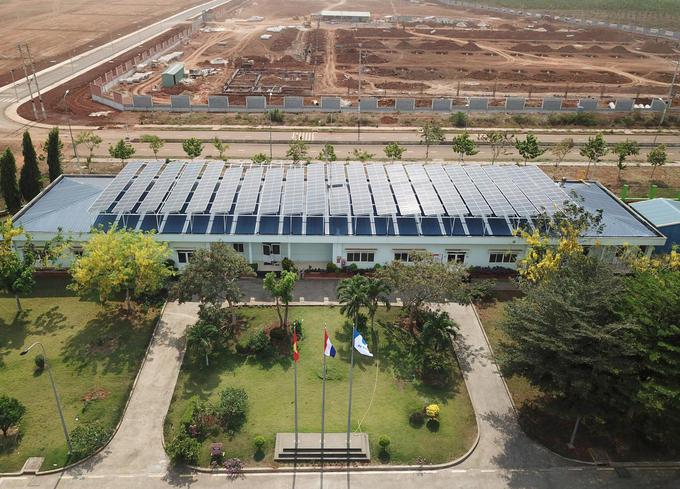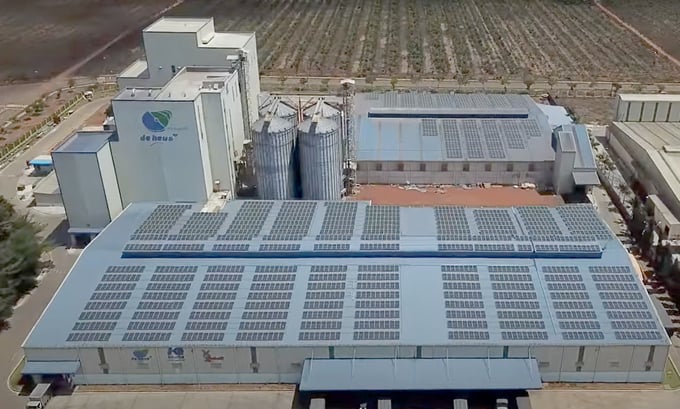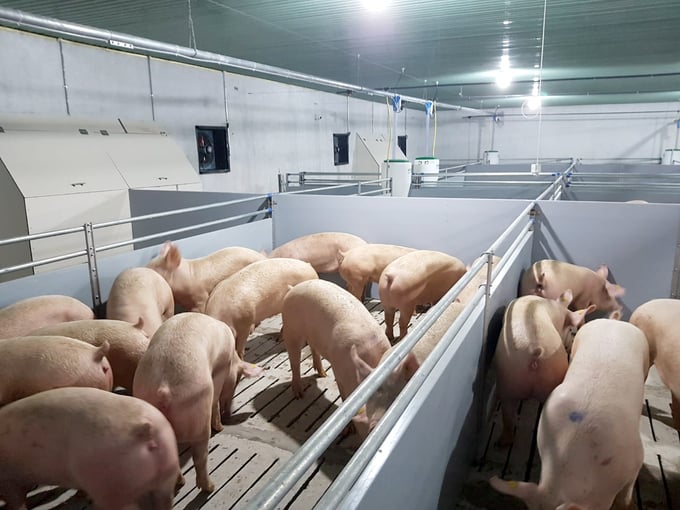November 27, 2025 | 01:15 GMT +7
November 27, 2025 | 01:15 GMT +7
Hotline: 0913.378.918
November 27, 2025 | 01:15 GMT +7
Hotline: 0913.378.918

Rooftop solar power is installed on the roof of the office area of De Heus Factory in Dong Nai. Photo: Thanh Son.
In early March this year, De Heus, Bel Ga, and Green Roof signed a Memorandum of Understanding marking the cooperation to develop the largest rooftop solar power project in 2023 in Vietnam.
Starting in the second quarter of 2023 and completed in 2024 with a total capacity of up to 20 MWp, the project will be deployed in 30 feed production sites, genetic breeding farms, and factories of De Heus and Bel Ga across Vietnam.
According to Mr. Gabor Fluit, General Director of De Heus Asia, in the past, some De Heus factories in Vietnam have invested in installing rooftop solar power, such as factories in Dong Nai, Vinh Long... With this project, De Heus does not work individually at each factory anymore but invests once for all factories and all hatcheries.
This rooftop solar power project will help De Heus and Bel Ga transition to more sustainable and low-emission agriculture and contribute to Vietnam's commitment to becoming a net emitter equal to zero by 2050. Specifically, the project is expected to generate more than 28 million kWh of clean energy and help reduce 22,500 tons of CO2 annually, equivalent to the CO2 absorption of 1 million mature trees or the removal of emissions of 5,000 cars a year.
Johan van den Ban, General Director of De Heus Vietnam, said, "De Heus is motivated to join hands to create a better, more sustainable future for Vietnam. With a leading position in the feed industry, the cooperation and development of rooftop solar projects at all of our production facilities in Vietnam are the next steps in our commitment to make real changes and contribute to a more sustainable food production chain. We look forward to this project's positive impact on the environment and society in Vietnam".
Johan van den Ban said that De Heus would continue to scale up and explore other ways of applying renewable energy, such as testing a Battery energy storage system (BESS) and installing floating solar power on aquaculture ponds.
In addition, De Heus is willing to join the DPPA (Direct Power Purchase Agreement) mechanism, which is a direct electricity purchase and sale mechanism between electricity users and renewable energy generators, as soon as this mechanism is officially approved in Vietnam. "It will be an important step to help De Heus realize his goal of maximizing the use of clean energy," said Johan van den Ban.

Rooftop solar power was installed on the roof of a De Heus factory. Photo: Thanh Son.
Rick van der Linden, General Director of Bel Ga and Director of Genetics of De Heus Vietnam, also expressed his expectation for the rooftop solar power project. He shared: “2023 marks the 10th anniversary of Bel Ga's establishment in Vietnam. We have carried out many charitable activities for the community in parallel with business development. But at the same time, we also realize our responsibility needs to be more than that. We believe we also have to contribute to environmental sustainability. This project is a milestone in Bel Ga's journey to becoming more sustainable, marking our start to use renewable energy more strategically and demonstrating our commitment to our sustainable development and responsible business”.
Nguyen Do Anh Tuan, Director of the Department of International Cooperation (MARD), said that the cooperation between De Heus, Bel Ga, and Green Roof would contribute to the more sustainable development of Vietnam's agriculture. He also hopes that businesses in the agricultural sector will continue to accompany them to promote their common strengths, especially to help Vietnamese farmers improve their capacity to adapt to climate change.
Gabor Fluit, General Manager of De Heus Asia, said animal feed production consumes a lot of electricity. Once completed, the project will only meet 20-25% of the total electricity for De Heus's feed mills in Vietnam.
De Heus Group's plan is to initially focus on building rooftop solar power systems for existing feed mills as much as possible. After completing all the plants, the Group calculates the missing electricity (from renewable energy), thereby investing in some significant renewable energy projects such as wind power and solar power.
Besides, after completing the rooftop solar power project for factories, De Heus will cooperate with fish, shrimp, pig, and chicken farms to support and guide the farms to apply solar power. With large farms using solar power, the electricity will surely be enough for the needs of the farm.

De Heus will support large-scale livestock and aquaculture farms to install solar power. Photo: Thanh Son.
For development to be more sustainable, with the orientation of a global sustainable development program called Responsible Feeding, De Heus has been implementing many strategic projects with many different sustainable activities.
Besides the rooftop solar power project, the sustainable procurement of raw materials, the promotion of domestic production of raw materials, optimization of logistics, and effective management of plastic waste are other visionary steps De Heus is working towards reducing carbon emissions. De Heus hopes to contribute to a more sustainable supply chain through these initiatives.
In terms of building a sustainable supply chain, De Heus is working with key partners in the food supply chain to make the whole chain sustainable by developing new farming methods and business models, using natural resource efficiency, and reducing greenhouse gas emissions.
For more sustainable development, with the orientation of a global sustainable development program called Responsible Feeding, De Heus has been implementing many strategic projects with many different sustainable activities.
Besides the rooftop solar power project, the sustainable procurement of raw materials, the promotion of domestic production of raw materials, optimization of logistics, and effective management of plastic waste are other visionary steps De Heus is working towards reducing carbon emissions. De Heus hopes to contribute to a more sustainable supply chain through these initiatives.
In terms of building a sustainable supply chain, De Heus is working with key partners in the food supply chain to make the whole chain sustainable by developing new farming methods and business models, using natural resource efficiency, and reducing greenhouse gas emissions.
By 2023, De Heus will perform CO2 measurements across all its business units. Also, in 2023, De Heus can provide customers with tailored advice on the farm to reduce carbon emissions. De Heus will set goals and find solutions to reduce the company's carbon emissions based on the measurement results.
Translated by Ha Phuc
/2025/11/26/4909-2-154329_878.jpg)
(VAN) Pearl grouper farming in HDPE cages not only delivers economic efficiency but also contributes to protecting the environment, creating jobs, and promoting marine-based experiential tourism.

(VAN) The model of making a living under the forest canopy through the agroforestry system in Van Son commune, Bac Ninh province, is expected to generate an annual income of approximately VND 30 million/ha.

(VAN) Many enterprises in Can Tho are harnessing natural energy and reducing greenhouse gas emissions in their production processes, thereby contributing to the promotion of a sustainable green transition.
/2025/11/24/3536-2-112800_176.jpg)
(VAN) Dong Nai now has tens of thousands of hectares of forests certified for sustainable management, and this area will continue to be expanded in the coming period.

(VAN) Vinh Ha hamlet (Dai Xuyen commune, Hanoi) is shifting away from small-scale farming as households adopt bioscurity into their breeder chicken models.

(VAN) Heavy rains make aquatic species more vulnerable to disease. Proactive water management and high-tech systems help farmers prevent outbreaks and protect yields.

(VAN) Greenhouses are shifting production mindsets in Binh Lu commune, enabling farmers to ‘weather the sun and rain’ and secure stable vegetable harvests throughout the year.